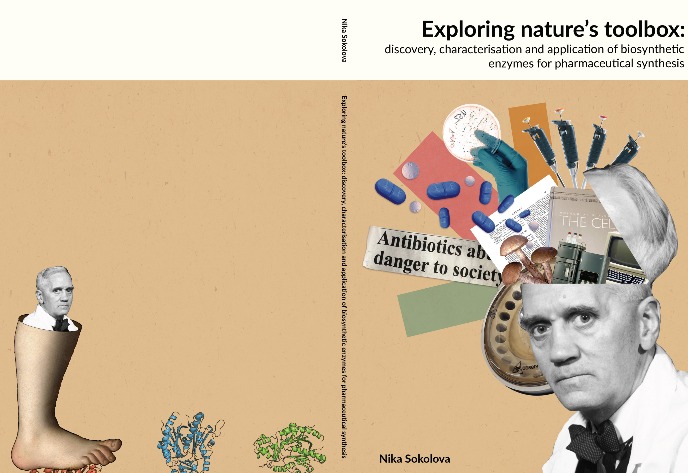Promotie N.V. (Nika) Sokolova

Ontdekking, karakterisering en toepassing van biosynthetische enzymen voor farmaceutische verbindingen
Traditionele methoden voor de productie van chemicaliën en geneesmiddelen maken vaak gebruik van toxische oplosmiddelen en vereisen extreme temperaturen of drukken. Door recente regelgeving in de Europese Unie die het gebruik van schadelijke stoffen zoals dimethylformamide beperkt, krijgt biokatalyse – het gebruik van enzymen of volledige cellen om chemische reacties uit te voeren – aan populariteit als een duurzamer alternatief.
Dit proefschrift van Nika Sokolova richtte zich op de ontdekking van nieuwe promiscuë biokatalysatoren via genoom-mining, functionele en structurele karakterisering van enzymen, en de ontwikkeling van biokatalytische cascades. De nieuw geïdentificeerde enzymen werden getest op hun vermogen om farmaceutische voorlopers, bioactieve verbindingen en volledig nieuwe moleculen te produceren die voorheen niet via biokatalyse toegankelijk waren.
Als resultaat leverde dit werk meer dan 30 nieuwe enzymen uit minder bekende organismen, identificeerde het meer dan 500 unieke enzym-substraatcombinaties die bruikbaar zijn voor machine learning, en bepaalde het drie nieuwe kristalstructuren van enzymen. Daarnaast gaf het waardevol inzicht in de waarschijnlijke natuurlijke functies van deze enzymen.
Enzymen staan erom bekend zeer specifiek te zijn, maar veel ervan kunnen ook reageren met niet-natuurlijke substraten. Deze flexibiliteit, bekend als substraatpromiscuïteit, wordt vaak waargenomen bij enzymen die betrokken zijn bij de biosynthese van natuurlijke producten. Ze helpt de grote structurele diversiteit te verklaren van verbindingen zoals flavonoïden of coumarinen. Belangrijk is dat deze promiscuïteit kan worden benut om nieuwe synthetische routes te ontwikkelen voor de productie van waardevolle industriële en farmaceutische verbindingen.
|
Supervisor:
| |
|
Co-supervisor:
|
